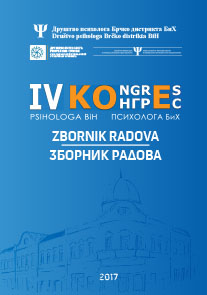Osobine ličnosti kao prediktori akademskog sagorijevanja studenata
Personality traits as predictors of academic burnout among students
Author(s): Tamara Efendić-Spahić, Elvis VardoSubject(s): Higher Education , Personality Psychology, Organizational Psychology, Health and medicine and law
Published by: Logotip
Keywords: personality traits; academic burnout; students;
Summary/Abstract: Professional burnout is usually defined as a set of symptoms in the form of emotional exhaustion, depersonalization, and reduced personal and professional fulfillment of pleasure because of participation in professional and personal activities. Dispositional characteristics are a significant risk factor for the development of burnout syndrome. Research conducted on a sample of 248 junior students at the Department of Philosophy in Tuzla, was aimed to determine the association between personality traits and intensity of burnout students. Examination of personality traits used A shortened version of the questionnaire Five factor personality (BFI Big Five Inventory) was used for examination of personality traits, which enables self-assessment of respondents on the five basic dimensions of personality. For the purpose of evaluation of academic burnout, we used the questionnaire of academic burnout (Schaufeli et al., 2002) that measures the level of burnout in academic terms. When checking the hypothesis we used multiple regression analysis, in which the basic dimensions of personality were treated as predictor, and academic burnout as a criterion variable. The results show that the symptoms of academic burnout are present with the junior students of different study profiles (M = 44.34, SD = 11.61), and that personality traits systematized through the five-factor model is a significant predictor of academic burnout (R = 0.56 df = 5, p = 0.00) and explained 31.9% of the total variability of academic burnout. From the personality traits that contribute most to the explanation of academic burnout are Conscientiousness (β = -0.373; p = 0.000), Neuroticism (β = 0.141; p = 0.03) and Openness (β = -0.164; p = 0.01). The research results show consistency with similar studies, and indicate the importance of compliance review program content with the possibilities of their implementation by the students, and the adaptation of the study program professional aspirations of students.
Journal: Zbornik radova Kongresa psihologa Bosne i Hercegovine
- Issue Year: 2017
- Issue No: 4
- Page Range: 9-23
- Page Count: 15
- Language: Bosnian

